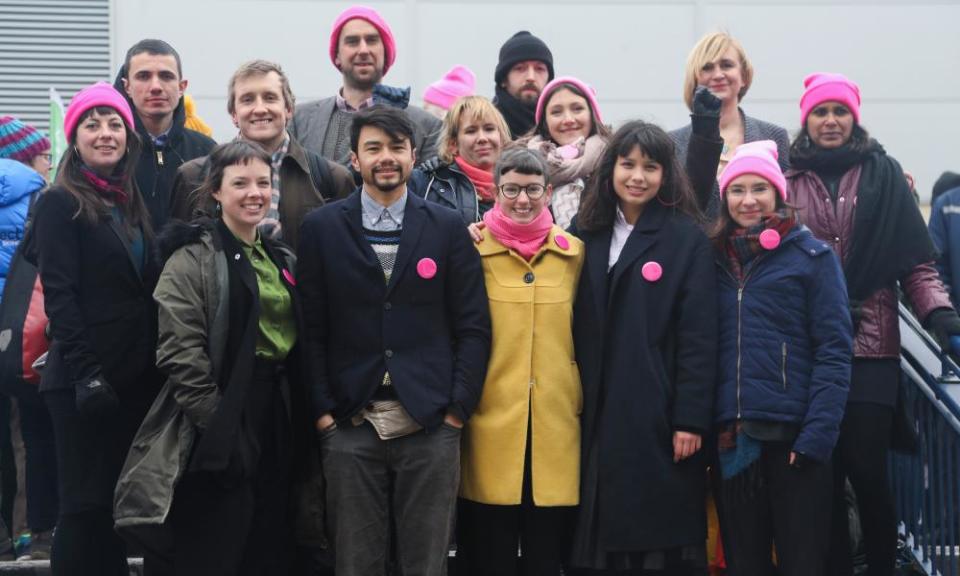Stansted 15 activists vow to overcome ‘dark, dark day for the right to protest’

The Stansted 15 expected to face retribution for their protest. They never expected to be found guilty of terrorism offences.
But on Monday, the group became the first activists involved in a non-violent direct action protest to be convicted under laws that were formulated in response to the Lockerbie bombing. After a judge told the jury to disregard evidence put forward to support their defence that their attempt to stop a deportation flight was intended to stop human rights abuses, the defendants must wait until February to learn if they will face custodial sentences.
Alistair Tamlit and Benjamin Smoke, both from London, told the Guardian that they continued to believe that their action was necessary. Both said their concerns about the hostile environment and the Home Office’s secretive policy of deporting people on charter flights were as strong now as before they decided to take part in the direct action at the Essex airport in March 2017.
“We were charged with endangering life but we took the actions at Stansted to try to protect life. That point needs to keep on being put into the spotlight,” said Smoke. “As a result of what we did, 11 people who were on that flight are still in the UK appealing against their removals. That’s something for us to hold on to.”
He expressed alarm at the draconian convictions, the first time activists involved in a non-violent direct action protest have been convicted of such offences. “Our convictions today represent an unprecedented crackdown on the right to protest,” he said. “The Home Office hasn’t changed its brutal policies. The inherent racism and violence of these forced removals remains.”
He said that activists would continue to fight against the hostile environment. “This fight is about seeing people as people not as collateral damage of the Home Office’s policies. Today is a dark, dark day for the right to protest in a non-violent way.”
Both activists said they had been lucky to not only have a mutual support network amongthe 15 who stood trial and have now been convicted, but a much bigger support network, too.
‘On a personal level it has been horrendous and has taken a huge mental and physical toll,” said Smoke.
Tamlit said: “We’re all in a state of shock, sitting around and letting the news filter through. Our action has brought the issue of Home Office charter flights into the public domain in a way that they weren’t before.
“One of the women from a migrant solidarity group told me that her applications to remain in the UK have been rejected for eight years in a row. Hearing about things like that really puts our situation into perspective.
“People like that woman are really at the sharp end of the hostile environment. People are still being rounded up and put on to charter flights, but the fact that 11 of the people who were taken off the charter flight we stopped are still here is something that is going to stay with me. The fight against the hostile environment will continue.”
The Home Office removes thousands of migrants including asylum seekers each year. Following the action to stop the charter flight at Stansted airport, the ministry is increasingly using military bases such as Brize Norton and often uses the services of Titan Airways for these flights. Titan does corporate work as well as operating charter flights for the oil and gas industries and the military.
Tamlit had been involved with activism in support of migrants since his student days, including a few actions prior to Stansted such as supergluing himself to a door and lying in a road to protest.
“Stopping a charter flight is an intervention that keeps people in the country,” he said. “It was very nerve-racking on our way to Stansted but we read out testimonies from Detained Voices, a group of immigration detainees, which gave us strength to do what we did.
“We were singing and chanting when we were locked on. When we were arrested and each of the activists walked out we all felt incredible love and solidarity for the others. We were shocked when the initial charges of aggravated trespass were increased to terrorism-related charges. That made me realise that government don’t want us to be doing these protests.”
Smoke described the ramping up of the charges as “a bit of a curveball”. He said that, as a member of Lesbians and Gays Support the Migrants, he knew what it felt like to be scapegoated. “I couldn’t stand idly by,” he said. “I felt it was important to use my voice and my privilege to speak up about how migrants are being treated by the Home Office.”

 Yahoo News
Yahoo News 